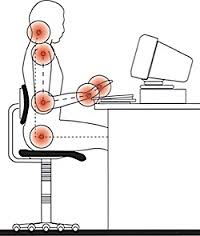What is repetitive strain injury (RSI)?
Repetitive Strain Injury (RSI) refers to a wide variety of problems. If you are feeling pains in your body that you know are caused by repetitive movements or poor posture, this may be RSI. You can get RSI in any part of your body. People associate RSI with the upper body such as the neck, arms, wrists, fingers, or shoulders. But it can also develop in your back, knees, and ankles.

We are all guilty of sitting at the computer or in front of the TV for too long, often slouched. This can trigger RSI, as a prolonged poor mechanical posture puts increased stresses on certain joints and muscles in the body. This can often lead to wrist, elbow, shoulder, and neck pains.
Sports and activities such as golf, tennis, painting, knitting, or playing a musical instrument can also lead to RSI. The strain of the repetitive movement can cause inflammation of the tendons or possible micro tears, leading to pain.
There are two types of RSI:
Type 1 – is caused by an underlying health condition, such as Carpal Tunnel Syndrome or Tendinitis
Type 2 – when pain persists but your symptoms do not fit in with any other health conditions and there is no swelling or problems with your nerves. This is also known as non-specific pain syndrome.
What causes RSI?
Some of the many reasons you get RSI include:
- Repetitive activities or movements on a regular basis
- Activities that involve lifting or carrying heavy objects
- Carrying out an activity for a long time without taking enough breaks to let your body rest
- Poor posture from a badly designed workstation
Examples of RSI:

Carpal Tunnel Syndrome (CTS) – caused by compression of the nerve through the carpal tunnel in the wrist area. When constricted, blood cannot flow freely through the hand to the fingers causing individuals with CTS to experience numbness and pain in the hand.
Elbow Medial and Lateral Epicondylitis – this is the same as Tennis and Golfer’s Elbow, which can occur as a result of strenuous overuse of the muscles and tendons where the bone and tendons join at the elbow.
Rotator Cuff Tendinitis – this is an inflammation of tendons in the shoulder. The condition is also called Shoulder Impingement Syndrome. Tendons are the attachments between muscles and bones. When they become inflamed due to repetitive movements, this can lead to pain.
Shin Splints – this is inflammation of the Tibialis Anterior muscle, and refers to pain along the shin bone (tibia) — the large bone in the front of your lower leg. It often occurs in athletes who have recently intensified or changed their training routine. It can occur in non-athletes, particularly in individuals with flat feet and who wear poorly supported shoes.
Plantar fasciitis – this is a form of RSI where the connective tissue underneath the foot connecting the heel bone to the toes becomes inflamed. This can cause intense heel and foot pain.
What are the early signs and symptoms of RSI?
There are many symptoms that will have you believe you have RSI, see below:
- Aches
- Burning pain
- Clumsiness
- Fatigue or lack of strength
- Stiffness
- Tingling
- Numbness
- Weakness
- Cramp
How is RSI diagnosed?
Your doctor will ask you about your symptoms and your medical history and ask you how and when you feel it started. X-rays do not detect RSI but they may rule out anything underlying before you can be diagnosed with RSI. MRI and Ultrasound Scans can assist in the diagnosis of RSI. A doctor or a physiotherapist can simply carry out a physical examination to confirm the diagnosis.
How long does it take for RSI to heal?
Everyone’s pain levels are different. Resting the problem area is key. Damaged tissues are hard to recover without substantial resting and careful management of your daily activities. RSI can take from weeks to months to heal, depending on its severity.
How can you recover from RSI?
Usually, a doctor will recommend getting plenty of rest and taking planned breaks during your day to do stretching exercises. You should also vary your tasks if possible and change the way you sit or move. They may also suggest taking anti-inflammatory medication and using ice or heat on the injured area until the pain eases. A physiotherapy programme can help you recover quicker and enable you to resume normal activities as soon as possible.
How is RSI treated?
There are various ways to help alleviate your pain and get you on the road to recovery as soon as possible. These include:
- Reducing activities
- Make changes at work
- Cold and heat packs
- Pain medications
- Physiotherapy
- Steroid injections
- Wearing splints or supports
- Stretching and strengthening exercises
- Acupuncture
- Electrotherapy such as ultrasound
- TENS machine
- Correcting poor posture
How can physiotherapy can help RSI
We will do whatever we can to get you on the fastest route to recovery. Some of the treatment methods we use include:
- Mobilisation
- Strengthening exercises
- Specific exercises for your posture
- Myofascial trigger point release
- Pilates
- Cross-friction massage
- Stretching and range of movement exercises
- Acupuncture
- Functional exercises
- Kinesio-taping
